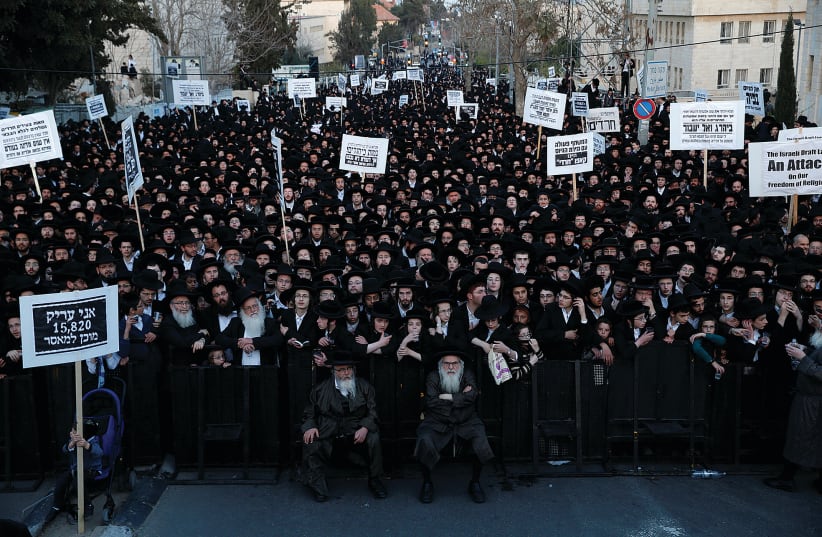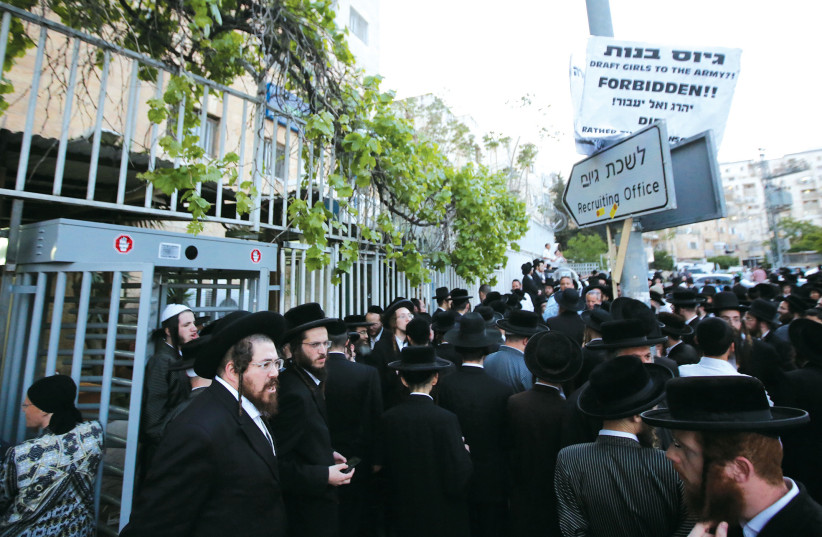The audience in Zion Theatre listened silently as the well-dressed rabbi facing it said passionately: “I wish to reach a time when the Jewish people will cry out loud: ‘We won’t go to battle!’”
No, Judah Magnes wasn’t ultra-Orthodox; in fact, he was Reform, and his cause, pacifism, fueled an interfaith struggle he joined with Christian priests.
It was 1923 that evening, and the wholesale violence that awaited the Zionist project had yet to erupt. But when the violence did arrive, the Jews did go to battle, ignoring Magnes’s admonition that “there is no greater sin or evil in life than war among the nations.”
Even so, some Jews did vow “We won’t go to battle,” as they reminded us this week when the Knesset passed in a first reading the new draft bill. Sadly, these non-warriors’ cause is not pacifism but draft evasion, which in this case is no less evil than war, maybe more.
THE BILL that passed Monday amends the Draft Law so that the age at which a yeshiva student can leave the yeshiva and go to work will decline from 26 to 21 and later rise to 23.
In addition, the amendment sets numerical targets for ultra-Orthodox students’ enlistment to the IDF and cuts budgeting for yeshivas that won’t meet the targets.
The amendment is part of a political saga older than 70 years. What began when David Ben-Gurion deferred 400 select students’ military service ballooned in 1977, when Menachem Begin effectively exempted all ultra-Orthodox men from full military service.
That’s how Ben-Gurion’s 400 exemptions became more than an annual 11,000. Meanwhile, the exempted men’s share of an annual intake of conscripts trebled, from 3.1% in 1976 to 9.2% in 1999, according to a report written by a governmental panel headed by the late justice Zvi Tal.
While this happened in the field, ultra-Orthodoxy’s deal was challenged on multiple fronts.
Legally, the High Court of Justice ruled that the entire arrangement violates the principle of equality before the law and is thus unconstitutional. Economically, it became clear that the rest of Israel will not be able to finance ultra-Orthodox nonwork much longer. And politically, the ultra-Orthodox deal came under fire for its immorality.
That is how politicians, from both sides of this divide, began seeking ways to increase the number of ultra-Orthodox workers and soldiers, a blessed effort that produced a plethora of ultra-Orthodox colleges, varied programs for ultra-Orthodox military service and assorted national-service alternatives.
Added up, this is part of ultra-Orthodoxy’s glacial but steady retreat from its historic hostility to the Zionist idea, the Jewish state and the IDF.
Thousands of ultra-Orthodox men and women are now acquiring professions none of their parents had – including programming, accounting, social work and law – and from there they proceed to the Israeli workplace, where they meet modernity, secularism, gentiles and also members of the opposite sex.
Despite this transition, ultra-Orthodox lawmakers responded to this week’s legislation as if Cossacks had stormed into the shtetl with orders to kidnap its boys and make them fight for the czar.
“THIS IS one of Israeli politics’ lowliest moments,” cried United Torah Judaism chairman Moshe Gafni. “It’s a wretched… anti-Jewish, anti-Torah law… they want to integrate the haredim… we won’t integrate; we want to get away from you!”
Anti-Jewish? Wow. Didn’t Maimonides himself write that in a “war of duty” – meaning one waged by an enemy out to destroy us, like Hamas, Hezbollah or Iran – “everyone goes out to the battle, even a groom from his room and a bride from under her wedding canopy” (Laws of the Kings, 7:4)?
Gafni’s colleague, Uri Maklev, went further. “You have turned Torah’s learners into criminal citizens!” he charged, and then produced two excuses – one old, the other new – for the draft-dodging that he is out to legitimize, industrialize and perpetuate.
The old argument was that “the army is not a value,” for “it is [merely] a necessity, [whereas] studying Torah is a value; those studying the Torah carry the burden no less than anyone else, and this is the tradition you are out to destroy!”
The novel argument was that “there is no need in the draft” because “as everyone knows,” the IDF “has thousands of soldiers for which there is no need.”
Well Rabbi Maklev, the army actually is a value. In the army, we set aside our sectarian colors and get to learn about, work with and care for each other. It is the place where Middle Israelis break the walls of the ghettos that you are out to cement. The army is why there is more social solidarity in Israel than in most other Western societies.
As for “necessity,” that can be said about work, and that is indeed what you fear but won’t admit: that once legally allowed to go to work, many will leave the yeshivas, which lead to the ghettos where you trap them for life. That’s what you fear, and not the study of Torah, which no one is out to harm, least of all an observant prime minister like Naphtali Bennett.
As for the army’s needs, yes, they are changing, and in recent years the IDF trimmed men’s service from 36 to 32 months. However, had your flock enlisted, our kids’ service could have been trimmed further.
In other words, not only do other Israelis risk their lives for Israel’s survival when their ultra-Orthodox brethren don’t, now they also serve more because you make others serve less, if at all.
That’s not merely unfair; legally, morally and also religiously, it’s a crime. This is what Moses meant when he rebuked the tribes of Reuben and Gad (Numbers 32:7): “Are your brothers to go to war while you stay here?”
The writer’s best-selling Mitzad Ha’ivelet Ha’yehudi (The Jewish March of Folly, Yediot Sefarim, 2019) is a revisionist history of the Jewish people’s leadership from antiquity to modernity.

